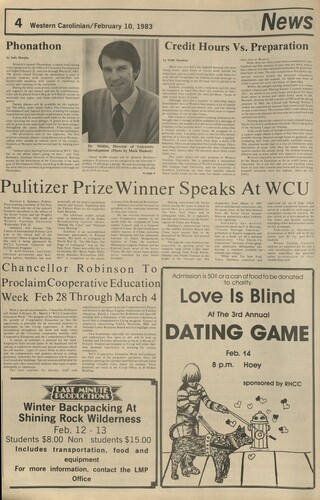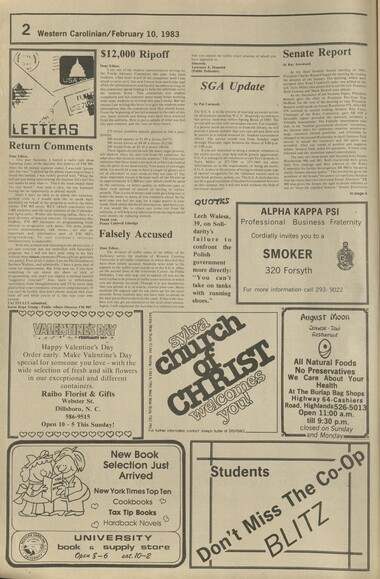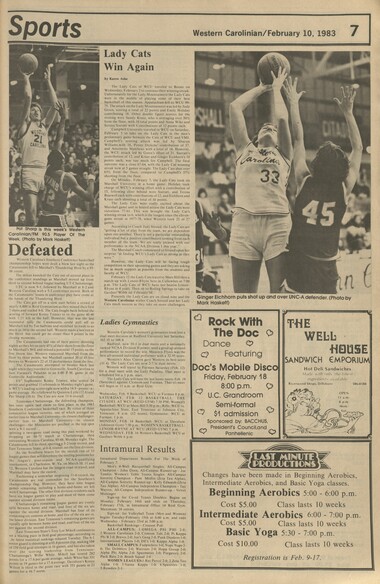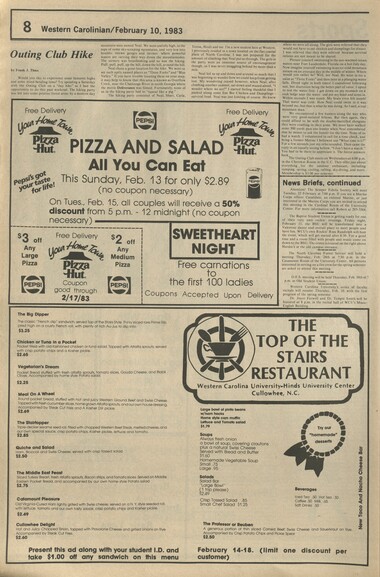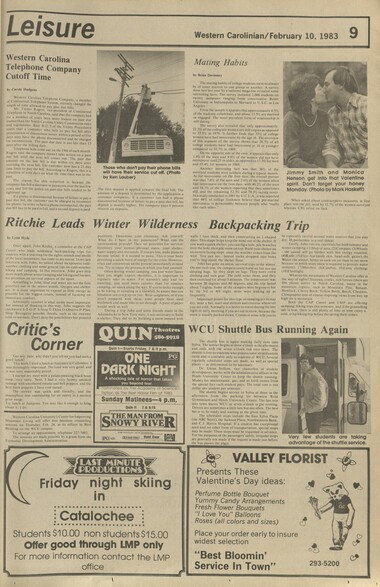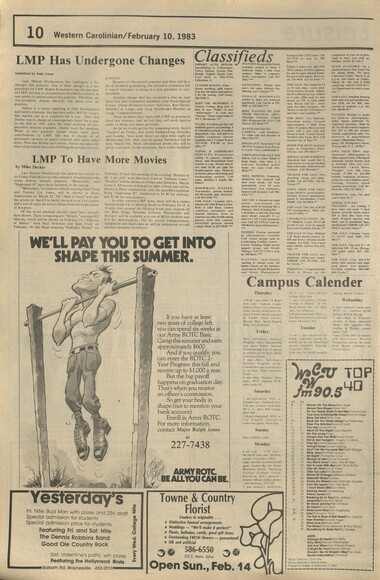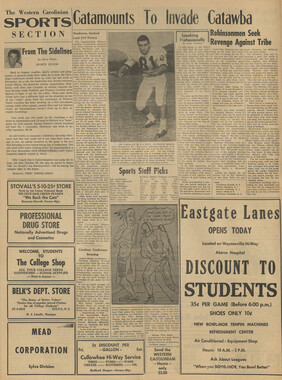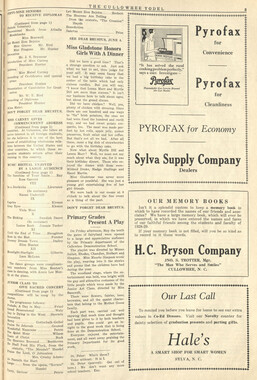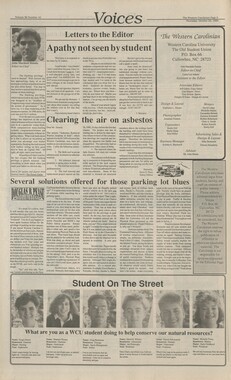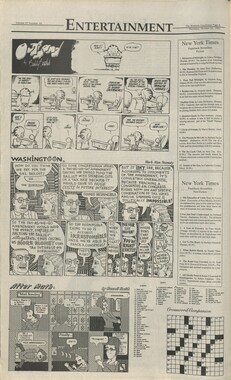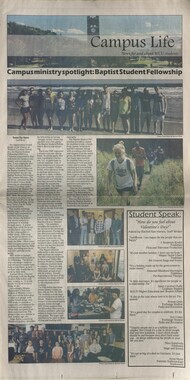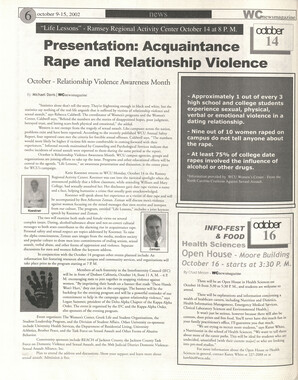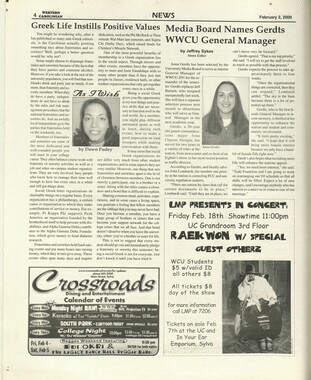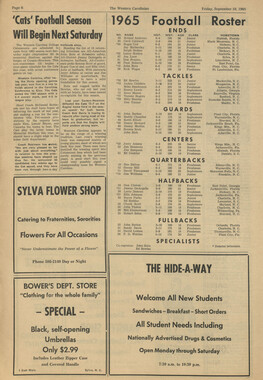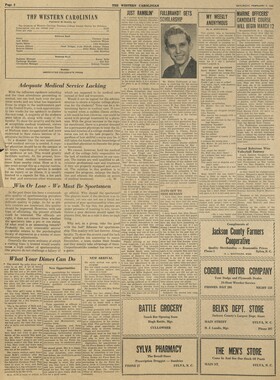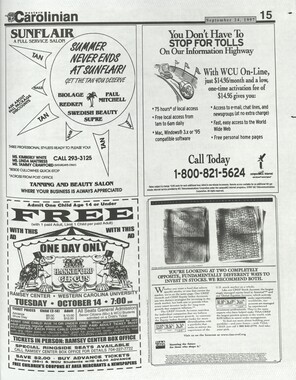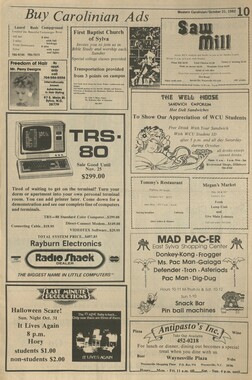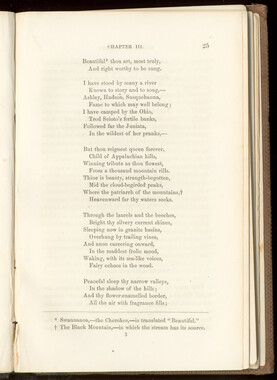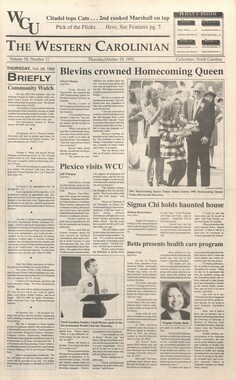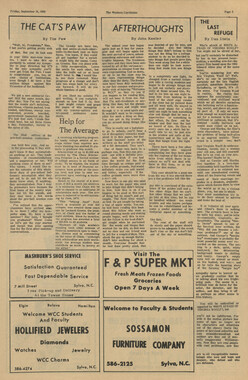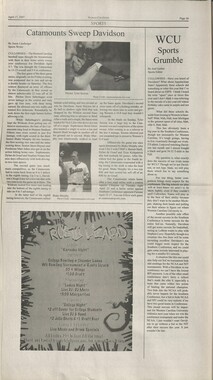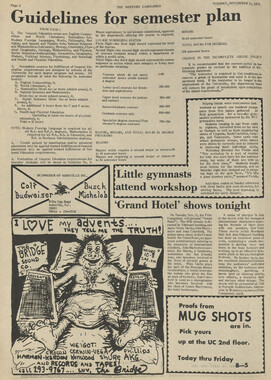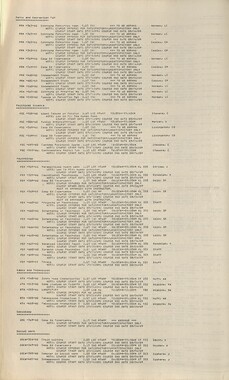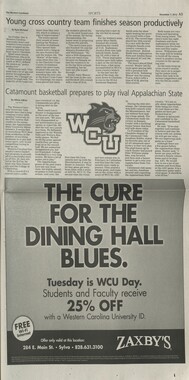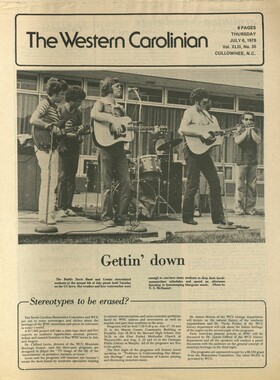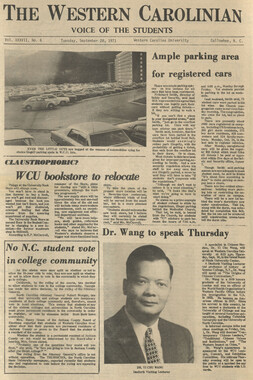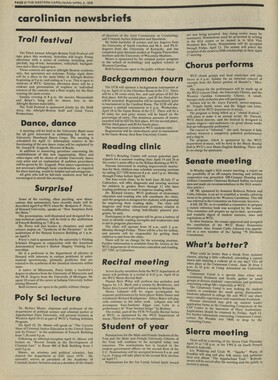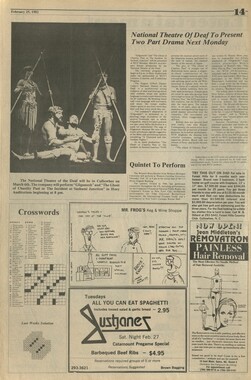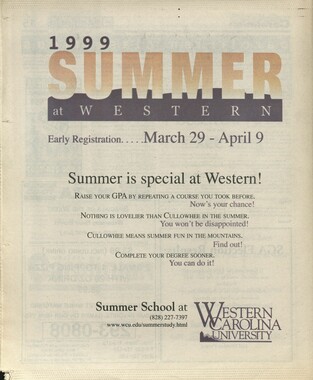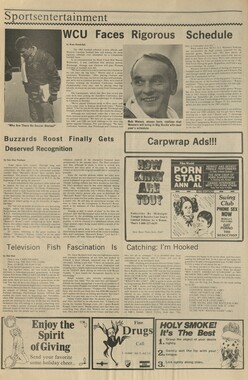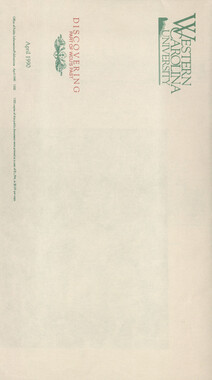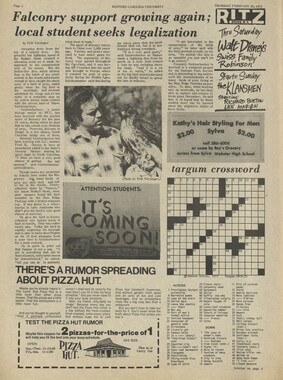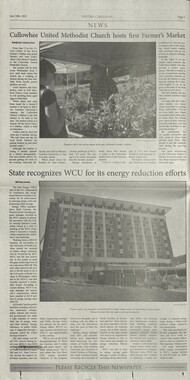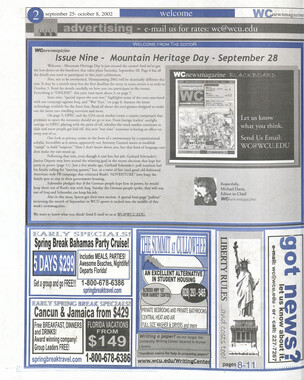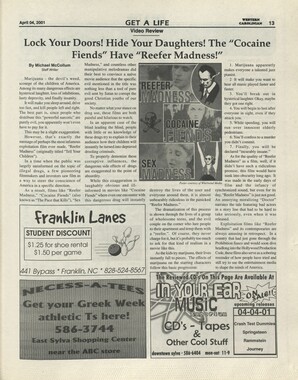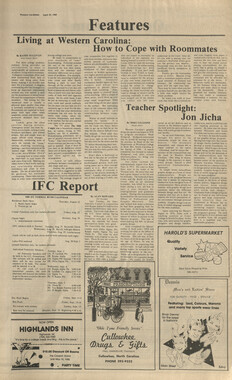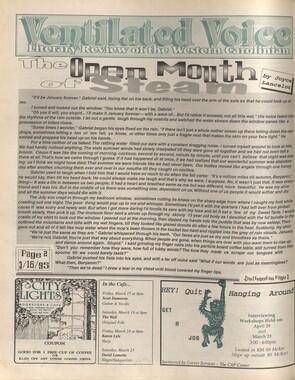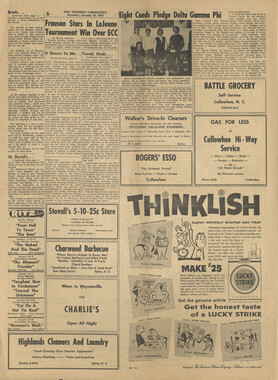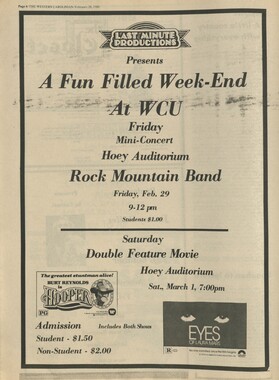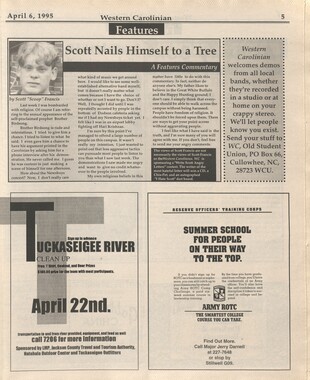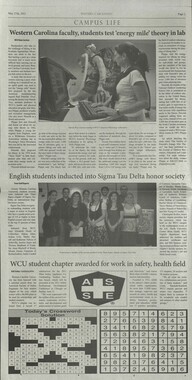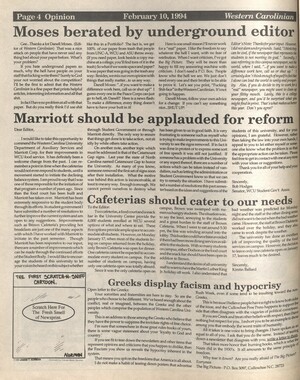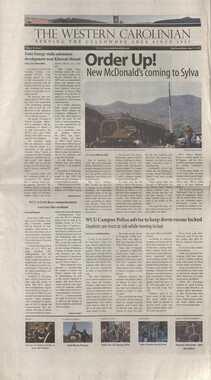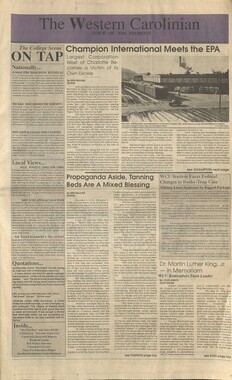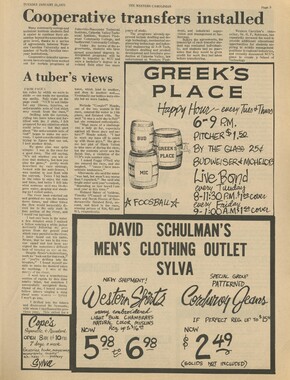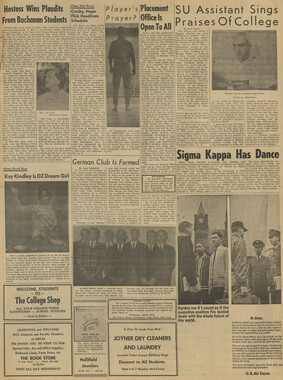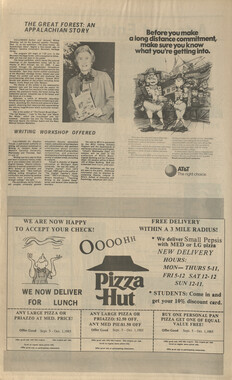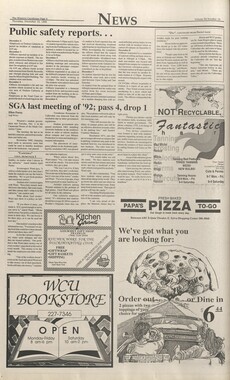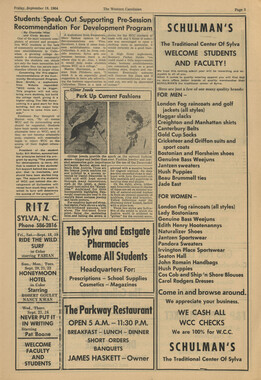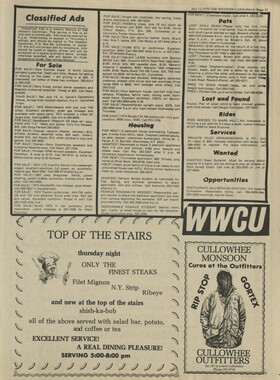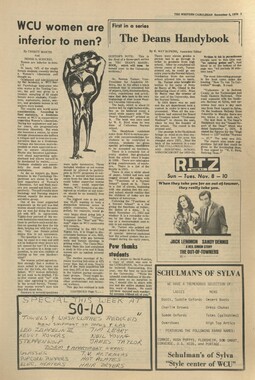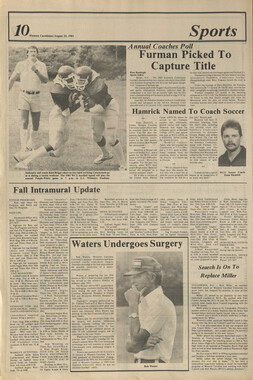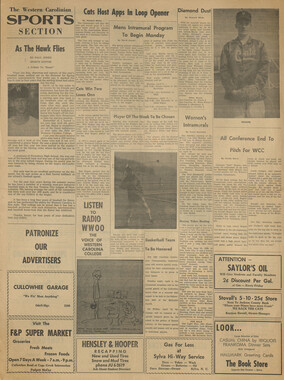Western Carolina University (21)
View all
- Canton Champion Fibre Company (2308)
- Cherokee Traditions (291)
- Civil War in Southern Appalachia (165)
- Craft Revival (1942)
- George Masa Collection (137)
- Great Smoky Mountains - A Park for America (3080)
- Highlights from Western Carolina University (422)
- Horace Kephart (973)
- Journeys Through Jackson (159)
- LGBTQIA+ Archive of Jackson County (89)
- Oral Histories of Western North Carolina (318)
- Picturing Appalachia (6617)
- Stories of Mountain Folk (413)
- Travel Western North Carolina (153)
- Western Carolina University Fine Art Museum Vitreograph Collection (129)
- Western Carolina University Herbarium (92)
- Western Carolina University: Making Memories (738)
- Western Carolina University Publications (2491)
- Western Carolina University Restricted Electronic Theses and Dissertations (146)
- Western North Carolina Regional Maps (71)
- World War II in Southern Appalachia (131)
University of North Carolina Asheville (6)
View all
- Allanstand Cottage Industries (62)
- Appalachian National Park Association (53)
- Bennett, Kelly, 1890-1974 (1463)
- Berry, Walter (76)
- Brasstown Carvers (40)
- Carver, George Washington, 1864?-1943 (26)
- Cathey, Joseph, 1803-1874 (1)
- Champion Fibre Company (233)
- Champion Paper and Fibre Company (297)
- Cherokee Indian Fair Association (16)
- Cherokee Language Program (22)
- Crowe, Amanda (40)
- Edmonston, Thomas Benton, 1842-1907 (7)
- Ensley, A. L. (Abraham Lincoln), 1865-1948 (275)
- Fromer, Irving Rhodes, 1913-1994 (70)
- George Butz (BFS 1907) (46)
- Goodrich, Frances Louisa (120)
- Grant, George Alexander, 1891-1964 (96)
- Heard, Marian Gladys (60)
- Kephart, Calvin, 1883-1969 (15)
- Kephart, Horace, 1862-1931 (313)
- Kephart, Laura, 1862-1954 (67)
- Laney, Gideon Thomas, 1889-1976 (439)
- Masa, George, 1881-1933 (61)
- McElhinney, William Julian, 1896-1953 (44)
- Niggli, Josephina, 1910-1983 (10)
- North Carolina Park Commission (105)
- Osborne, Kezia Stradley (9)
- Owens, Samuel Robert, 1918-1995 (11)
- Penland Weavers and Potters (36)
- Roberts, Vivienne (15)
- Roth, Albert, 1890-1974 (142)
- Schenck, Carl Alwin, 1868-1955 (1)
- Sherrill's Photography Studio (2565)
- Southern Highland Handicraft Guild (127)
- Southern Highlanders, Inc. (71)
- Stalcup, Jesse Bryson (46)
- Stearns, I. K. (213)
- Thompson, James Edward, 1880-1976 (226)
- United States. Indian Arts and Crafts Board (130)
- USFS (683)
- Vance, Zebulon Baird, 1830-1894 (1)
- Weaver, Zebulon, 1872-1948 (58)
- Western Carolina College (230)
- Western Carolina Teachers College (282)
- Western Carolina University (2008)
- Western Carolina University. Mountain Heritage Center (18)
- Whitman, Walt, 1819-1892 (10)
- Wilburn, Hiram Coleman, 1880-1967 (73)
- Williams, Isadora (3)
- Cain, Doreyl Ammons (0)
- Crittenden, Lorraine (0)
- Rhodes, Judy (0)
- Smith, Edward Clark (0)
- Appalachian Region, Southern (3032)
- Asheville (N.C.) (1945)
- Avery County (N.C.) (26)
- Blount County (Tenn.) (195)
- Buncombe County (N.C.) (1680)
- Cherokee County (N.C.) (283)
- Clay County (N.C.) (556)
- Graham County (N.C.) (238)
- Great Smoky Mountains National Park (N.C. and Tenn.) (525)
- Haywood County (N.C.) (3573)
- Henderson County (N.C.) (70)
- Jackson County (N.C.) (4925)
- Knox County (Tenn.) (35)
- Knoxville (Tenn.) (13)
- Lake Santeetlah (N.C.) (10)
- Macon County (N.C.) (421)
- Madison County (N.C.) (216)
- McDowell County (N.C.) (39)
- Mitchell County (N.C.) (135)
- Polk County (N.C.) (35)
- Qualla Boundary (982)
- Rutherford County (N.C.) (78)
- Swain County (N.C.) (2185)
- Transylvania County (N.C.) (270)
- Watauga County (N.C.) (12)
- Waynesville (N.C.) (86)
- Yancey County (N.C.) (72)
- Aerial Photographs (3)
- Aerial Views (60)
- Albums (books) (4)
- Articles (1)
- Artifacts (object Genre) (228)
- Bibliographies (1)
- Biography (general Genre) (2)
- Cards (information Artifacts) (38)
- Clippings (information Artifacts) (192)
- Copybooks (instructional Materials) (3)
- Crafts (art Genres) (622)
- Depictions (visual Works) (21)
- Design Drawings (1)
- Digital Moving Image Formats (2)
- Drawings (visual Works) (185)
- Envelopes (101)
- Exhibitions (events) (1)
- Facsimiles (reproductions) (1)
- Fiction (general Genre) (4)
- Financial Records (12)
- Fliers (printed Matter) (67)
- Glass Plate Negatives (381)
- Guidebooks (2)
- Internegatives (10)
- Interviews (823)
- Land Surveys (102)
- Letters (correspondence) (1045)
- Manuscripts (documents) (618)
- Maps (documents) (177)
- Memorandums (25)
- Minutes (administrative Records) (59)
- Negatives (photographs) (6090)
- Newsletters (1290)
- Newspapers (2)
- Notebooks (8)
- Occupation Currency (1)
- Paintings (visual Works) (1)
- Pen And Ink Drawings (1)
- Periodicals (194)
- Personal Narratives (10)
- Photographs (12977)
- Plans (maps) (1)
- Poetry (6)
- Portraits (4568)
- Postcards (329)
- Programs (documents) (181)
- Publications (documents) (2444)
- Questionnaires (65)
- Relief Prints (26)
- Sayings (literary Genre) (1)
- Scrapbooks (282)
- Sheet Music (2)
- Slides (photographs) (402)
- Songs (musical Compositions) (2)
- Sound Recordings (802)
- Specimens (92)
- Speeches (documents) (18)
- Tintypes (photographs) (8)
- Transcripts (329)
- Text Messages (0)
- A.L. Ensley Collection (275)
- Appalachian Industrial School Records (7)
- Appalachian National Park Association Records (336)
- Axley-Meroney Collection (2)
- Bayard Wootten Photograph Collection (20)
- Bethel Rural Community Organization Collection (7)
- Blumer Collection (5)
- C.W. Slagle Collection (20)
- Canton Area Historical Museum (2110)
- Carlos C. Campbell Collection (462)
- Cataloochee History Project (64)
- Cherokee Studies Collection (4)
- Daisy Dame Photograph Album (5)
- Daniel Boone VI Collection (1)
- Doris Ulmann Photograph Collection (112)
- Elizabeth H. Lasley Collection (1)
- Elizabeth Woolworth Szold Fleharty Collection (4)
- Frank Fry Collection (95)
- George Masa Collection (173)
- Gideon Laney Collection (452)
- Hazel Scarborough Collection (2)
- Hiram C. Wilburn Papers (28)
- Historic Photographs Collection (236)
- Horace Kephart Collection (861)
- Humbard Collection (33)
- Hunter and Weaver Families Collection (1)
- I. D. Blumenthal Collection (4)
- Isadora Williams Collection (4)
- Jesse Bryson Stalcup Collection (47)
- Jim Thompson Collection (224)
- John B. Battle Collection (7)
- John C. Campbell Folk School Records (80)
- John Parris Collection (6)
- Judaculla Rock project (2)
- Kelly Bennett Collection (1482)
- Love Family Papers (11)
- Major Wiley Parris Civil War Letters (3)
- Map Collection (12)
- McFee-Misemer Civil War Letters (34)
- Mountain Heritage Center Collection (4)
- Norburn - Robertson - Thomson Families Collection (44)
- Pauline Hood Collection (7)
- Pre-Guild Collection (2)
- Qualla Arts and Crafts Mutual Collection (12)
- R.A. Romanes Collection (681)
- Rosser H. Taylor Collection (1)
- Samuel Robert Owens Collection (94)
- Sara Madison Collection (144)
- Sherrill Studio Photo Collection (2558)
- Smoky Mountains Hiking Club Collection (616)
- Stories of Mountain Folk - Radio Programs (374)
- The Reporter, Western Carolina University (510)
- Venoy and Elizabeth Reed Collection (16)
- WCU Gender and Sexuality Oral History Project (36)
- WCU Mountain Heritage Center Oral Histories (25)
- WCU Oral History Collection - Mountain People, Mountain Lives (71)
- WCU Students Newspapers Collection (1923)
- Western North Carolina Tomorrow Black Oral History Project (69)
- William Williams Stringfield Collection (2)
- Zebulon Weaver Collection (109)
- African Americans (390)
- Appalachian Trail (35)
- Artisans (521)
- Cherokee art (84)
- Cherokee artists -- North Carolina (10)
- Cherokee language (21)
- Cherokee pottery (101)
- Cherokee women (208)
- Church buildings (190)
- Civilian Conservation Corps (U.S.) (111)
- College student newspapers and periodicals (2012)
- Dams (108)
- Dance (1023)
- Education (222)
- Floods (63)
- Folk music (1015)
- Forced removal, 1813-1903 (2)
- Forest conservation (220)
- Forests and forestry (1198)
- Gender nonconformity (4)
- Great Smoky Mountains National Park (N.C. and Tenn.) (181)
- Hunting (47)
- Landscape photography (25)
- Logging (122)
- Maps (83)
- Mines and mineral resources (9)
- North Carolina -- Maps (18)
- Paper industry (38)
- Postcards (255)
- Pottery (135)
- Railroad trains (72)
- Rural electrification -- North Carolina, Western (3)
- School integration -- Southern States (2)
- Segregation -- North Carolina, Western (5)
- Slavery (5)
- Sports (452)
- Storytelling (243)
- Waterfalls -- Great Smoky Mountains (N.C. and Tenn.) (66)
- Weaving -- Appalachian Region, Southern (280)
- Wood-carving -- Appalachian Region, Southern (328)
- World War, 1939-1945 (173)
Western Carolinian Volume 47 Number 19
Item
Item’s are ‘child’ level descriptions to ‘parent’ objects, (e.g. one page of a whole book).
-
-
4 Western Carolinian/February 10, 1983 News Phonathon by Judy Murphy Western's annual Phonothon, a major fund raising event sponsored by the Office of University Development will begin February 21, and run through March 10, 1983. Ihe money raised through the phonothon is used to provide students with academic scholarships and faculty/staff members with awards of excellence in service and teaching in the institution. During the three week period, teams of four students will organize to call alumni and ask for contributions. Calls will be placed from 6:00 p.m. to 9:30 p.m. except on weekends and nights with home scheduled basketball games. Twenty phones will be available for the students' use. The office, under James Duley, Vice Chancellor for Development and Special Services, is asking for campus organizations and individuals to participate in the event. A prize will be awarded each night to the person or team receiving the most pledges. A grand prize of S100 will be given to the individual/team for the most pledges throughout the entire Phonothon. Fraternities and Sororities will receive credit for service to the institution. The phonothon runs in two segments. The first involves volunteer alumni - using phones not at Western - calling other alumni in various parts of the country. Students at Western run the second part by making their calls. "Alumni enjoy hearing from students at WCU. They like to ask about what's going on here," said Tom Brommer, Assistant Director of Development. Raising money for the betterment of the University is the main goal of Development Office according to Brommer, and the most effective method of getting money is through the Phonothon. Credit Hours Vs. Preparation Dr. Midlin, Director of University Development. (Photo by Mark Haskett) About 18,000 alumni will be phoned. Brommer estimates 19 persons can be contacted in one hour and 11 of these 19 will make a pledge. He said an average pledge is around SI2.80 of which $10 will be collected. This adds up to $110 per hour. to page 6 by Willie Dawkins Have you ever felt a bit slighted because you were doing hours upon hours of course work outside the classroom, and were only receiving three credit hours for your efforts'.' Sometimes the tedious outside hours get to be a little frustrating, to say the least, but it's all due to be university policy. Students partaking in this extra-hour activity may be reassured to learn that there are students at other universities who confront the same problem - hours of time versus hours of credit. Although there are a number of individual major departments here at Western that require a lot of outside time, the art, speech and theatre arts, and the nursing departments are three major areas which seem to require an overdose of out-of-class hours. One common misconception among students is the thought that if enough of them complain of a shortage of credit hours, the number ol credit hours will be increased. Contrary to this popular belief, it is university policy that a certain number of credit hours be assigned to a particular class. University policy is this: for fifty minute meeting of a class per week, one credit hour is applied. Therefore, if your class meets three days a week (150 minutes), then you are awarded three credit hours. This is providing, of course, that you pass the class. Classesthat meet twice weekly (also 150 minutes) merit three credit hours too. This credit policy not only pertains to Western Carolina University, but is apparently a nationwide convention. The University of North Carolina at Chapel Hill, Indiana State University, and the University of Southern California are only three familiar schools whose credit hours are the same for similar courses as those here at Western. While there are three credit hours awarded for one- hundred and fifty minutes of class time per week, policy has it that no less than two credit hours may be given for each hour of class. The only exceptions to th.s policy are service courses within the physical education departments and lab sessions, for which one hour of credit is given for every two hours of class time. Within the campus nursing department is a course entitled Clinical and Nursing Science I (course number 351) lor which seven credit hours were given for three hours spent in lecture and twelve hours spent in lab. Recently between the fall semester of 1982 and the spring semester of 1983. the Clinical and Nursing Sc.ence I course was awarded an increase from seven credit hours to nine credit hours. This increase dtdn t come about due to the university because the issue was not concerned with institutional policy. Nursing majors are required to work clinical hours, but do not receive credit hours for them. This is the policy of the National League for Nursing. If the credit hours of enough courses were increased, a student might obtain a degree in less than four years, possibly having obtained enough hours to graduate, yet exempting him from conventionally required classes. This situation would lead to a loss of familiarity with disiciplines in areas other than the major when the student reaches the outside world. The student would be efficient only in areas which were majored in at school. Western is basically on track with what is acceptable bythe Board of Education as far as credit hours are concerned. So if you feel that you are exerting extra hours of your time towards class work and are not being properly rewarded, don't feel slighted. After all, it's policy. Pulitizer Prizewinner Speaks At WCU Harrison E. Salisbury, Pulitzer Prize-winning journalist of The New York Times and one of the nation's foremost specialists in the affairs of the Soviet Union and the People's Republic of China, will speak at Western Carolina University Wednesday, Feb. 23. Salisbury will discuss "The Future of International Politics" at 8 p.m. in the recital hall of the university's Music-English Building. His visit is being sponsored by WCU's Lectures, Concerts and Exhibitions Program. A well-known national television personality and best- selling author, Salisbury has won practically all the major journalistic awards and honors, beginning with the Pulitzer Prize for his dispatches from Moscow. His television credits include stints as moderator of the Public Broadcasting System shows, "Behind the Lines" and "National Town Meeting." Salisbury is an accomplished historian, particularly in Russian history. His book on Leningrad in World War II, "The 900 Days: The Seige of Leningrad," was on The New York Times best-seller list for six months. His "Black Night, White Snow: Russian's Revolutions 1905- 1917" is recognized as the classic account of the Bolshevik Revolution. Salisbury served for two years as ' president of the American Academy of Arts and Letters. He has traveled extensively in every Communist country in the world with the exception of Cuba (under Castro) and is a frequent visitor to China. He has visited many remote regions of China, including Inner Mongolia and has repeatedly traveled to Outer Mongolia,the borders of Tibet, the northern Himalayan rcagions, Sikkim and the Central Asian areas of the Soviet Union. He has visited many points never touched by any other foreigner. Having crisscrossed the Soviet Union during the years in which he served there as a correspondent for The New York Times and in subsequent visits, he is especially familiar with Siberia and the border regions of China and Russia. Salisbury's controversial views on the conflict between Russia and China have caused him to be denounced by Moscow and praised by Peking. t Through the years Salisbury has succeeded in gaining entry to countries long closed to the outer world, among them North Korea, Albania and North Vietnam at the height of the Vietnam war. His Chancellor Robinson To ProclaimCooperative Education Week Feb 28 Through March 4 despatches from Hanoi in 1967 stirred intcrnaional controversy, and for many years, he has been banned from the Soviet Union because Moscow authorities object violently to his reporting. Salisbury has written extensively about the U.S. His essay, "Travels Through American," published in Esquire magazine and later as a book, set off a national controversy. "The Shook-Up Generation," his study of teen gangs and adolescent delinquency has become a standard textbook in schools and colleges. While with The New York Times, Salisbury conceived and supervised the op/ed page which won several journalistic honors and served as a model for such pages in newspapers across the country. He also served as a correspondent for The Times and became assistant managing editor and associate editor of that newspaper. Admission to Salisbury's presentation at WCU will be $5 for adults and $2 for non-WCU students. Western Carolina University students are admitted for $1 with a valid identification card and LCE season subscribers are admitted upon presentation of their membership card. With a special proclamation. Chancellor Robinson will declare February 28 - March 4 "WCU Cooperative Education Week." The purpose of the week is to promote the growth of Cooperative Education so that the opportunity is provided for all interested students to participate in the Co-op experience. A blitz of information throughout the week will make every member of the University community familiar with Cooperative Education and the Comprehensive Project. A variety of activities is planned for the week. Employers from several states in the Southeast will be talking to students in classes and special seminars about the job market., types of career fields in their employ, and the competencies and qualities desired in college graduates. Schedules for these employers will be posted in all academic buildings. Special sessions will be held for seniors and other interested students who want to speak informally to employers. The first seminar for faculty, staff and administrators to learn about the Comprehensive Project will be held in the Music English Auditorium on Tuesday afternoon, March 1. Chancellor Robinson will open the meeting with a discussion of the university's decision to move into a comprehensive Co-op program. A panel of employers representing NASA, Motorola, IBM, and National Labor Relations Board will bea highlight of the seminar. Two workshops, especially for interested freshmen and sophomores (but open to all), will be held on Tuesday and Thursday afternoons at 4 p.m. in Room 127 Forsyth. Student participants in Co-op will relate their own personal experiences in working for various companies. WCU Cooperative Education Week will celebrate the fifth year of the program's operation. Over 120 position openings for summer (and fall) are already listed including virtually every major on campus. These positions are listed in the Co-op Office in 20 McKee Building. If LAiT MINUTE PRODUCTIONS Winter Backpacking At Shining Rock Wilderness Feb. 12 - 13 Students $8.00 Non students $15.00 Includes transportation, food and equipment For more information, contact the LMP Office i_ Admission is 50C or a can of food to be donated to charity. Love Is Blind At The 3rd Annual DATING GAME Feb. 14 8 p.m. Hoey sponsored by RHCC
Object
Object’s are ‘parent’ level descriptions to ‘children’ items, (e.g. a book with pages).
-
The Western Carolinian is Western Carolina University's student-run newspaper. The paper was published as the Cullowhee Yodel from 1924 to 1931 before changing its name to The Western Carolinian in 1933.
-

